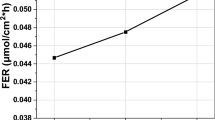Abstract
To improve the durability of polymer electrolyte membrane fuel cell polymer membranes, it is important to evaluate their durability in a short time. In 2016, the U.S. Department of Energy (DOE) presented the AST protocol, a degradation method that simultaneously performs electrochemical and mechanical degradation. The AST protocol has several problems such as long evaluation time, electrode degradation due to open circuit voltage changes, and difficulty in determining whether the durability of the polymer membrane is electrochemically or mechanically weaker. Based on the DOE accelerated stress test protocol, we supplied O2 instead of air to the cathode, increased the drying time, distinguished and improved electrochemical/mechanical evaluation methods. The improved AST protocol reduced the evaluation time of the Nafion XL membrane electrode assembly by approximately 3 times or more, and the degradation of the electrode catalyst was also reduced by 1/3. In addition, it was confirmed that the polymer membrane exhibited weaker mechanical durability than electrochemical; hence, it was possible to ascertain the cause of the degradation, such that the durability of the polymer membrane can be evaluated more accurately.







Similar content being viewed by others
References
W. Wu, J. Yang, H. Zhan, X.K. Yan, X. Zuo, Korean J. Chem. Eng. 39, 2055 (2022)
S. Woo, S. Kim, S. Woo, S. Park, Y. Kang, N. Jung, S. Yim, Korean J. Chem. Eng. 40(10), 2455 (2023)
G. Yang, H. Wang, F. Su, S. Li, G. Zhang, J. Sun, Q. Shen, Z. Jiang, J. Liao, P. Chen, Korean J. Chem. Eng. 40(7), 1598 (2023)
Y. Wang, K.S. Chen, J. Mishler, S.C. Cho, X.C. Adroher, Appl. Energy 88(4), 981 (2011)
S. Park, D. Choi, D. Lee, B. Choi, S. Yoo, Korean J. Chem. Eng. 40(7), 1549 (2023)
S. Oh, D. Lim, K. Park, Korean Chem. Eng. Res. 59(1), 1 (2021)
S. Venkatesan, C. Lim, S. Holdcroft, E. Kjeang, J. Electrochem. Soc.Electrochem. Soc. 163(7), F637 (2016)
B. Wu, M. Zhao, W. Shi, W. Liu, J. Liu, D. Xing, Y. Yao, Z. Hou, P. Ming, J. Gu, Z. Zou, Int. J. Hydrog. EnergyHydrog. Energy 39(26), 14381 (2014)
F.D. Coms, H. Xu, T. McCallum, C. Mittelsteadt, ECS Trans. 64(3), 389 (2014)
T.H. Kim, J.H. Lee, H. Lee, T.W. Lim, K.P. Park, Korean Chem. Eng. Res. 45(4), 345 (2007)
X.-Z. Yuan, H. Li, S. Zhang, J. Martin, H. Wang, J. Power Sour 196(22), 9107 (2011)
M. Chandesris, R. Vincent, L. Guetaz, J.S. Roch, D. Thoby, M. Quinaud, Int. J. Hydrog. EnergyHydrog. Energy 42(12), 8139 (2017)
S. Vengatesan, M.W. Fowler, X.Z. Yuan, H. Wang, J. Power. Sources 196(11), 5045 (2011)
R. Sharma, S. Gyergyek, Q. Li, S.M. Andersen, J. Electrochem. Soc.Electrochem. Soc. 838, 82 (2019)
D. Lim, S. Oh, S. Jung, J. Jeong, K. Park, Korean Chem. Eng. Res. 59(1), 1 (2021)
DOE fuel cell technologies office, multi-year research, development and demonstration plan (2016). https://energy.gov/sites/prod/files/2016/10/f33/fcto_myrdd_fuel_cells.pdf.
D. Yoo, B. Hwang, S. Oh, K. Park, Korean J. Chem. Eng. 40(8), 2004 (2023)
New energy and industrial technology development organization, https://www.nedo.go.jp/, (2016).
S. Oh, J. Gwon, D. Lim, K. Park, Korean Chem. Eng. Res. 59(1), 1 (2021)
R. Mukundan, Fuel Cell – performance and durability FC139 – modeling, evaluation, characterization. 2016 DOE fuel cell technologies office annual merit review. June 8th (2016).
Acknowledgements
This work was supported by the Technology Innovation Program (20015756) funded by the Ministry of Trade, Industry & Energy (MOTIE, Korea).
Funding
Ministry of Trade, Industry and Energy, 20015756, Kwon Pil Park.
Author information
Authors and Affiliations
Corresponding author
Additional information
Publisher's Note
Springer Nature remains neutral with regard to jurisdictional claims in published maps and institutional affiliations.
Rights and permissions
Springer Nature or its licensor (e.g. a society or other partner) holds exclusive rights to this article under a publishing agreement with the author(s) or other rightsholder(s); author self-archiving of the accepted manuscript version of this article is solely governed by the terms of such publishing agreement and applicable law.
About this article
Cite this article
Oh, S., Lim, D., Han, Y. et al. Development of Chemical and Mechanical Acceleration Stress Test Method for PEMFC Polymer Membranes. Korean J. Chem. Eng. 41, 545–552 (2024). https://doi.org/10.1007/s11814-024-00040-5
Received:
Revised:
Accepted:
Published:
Issue Date:
DOI: https://doi.org/10.1007/s11814-024-00040-5



